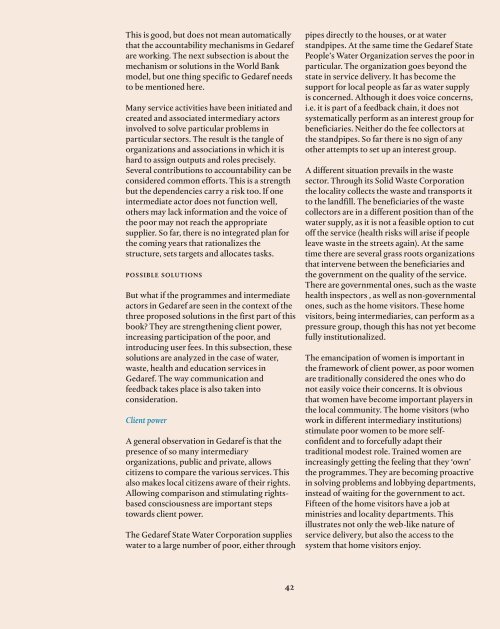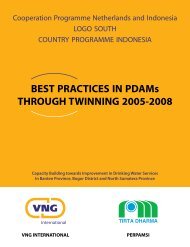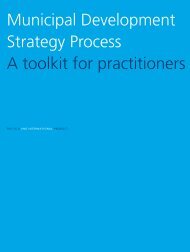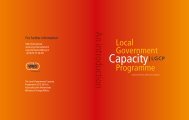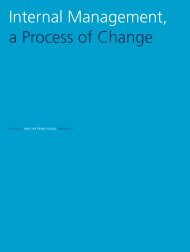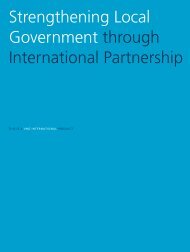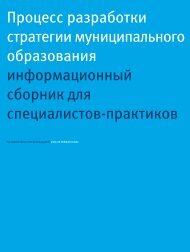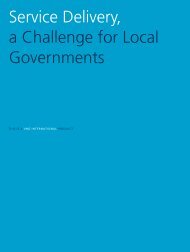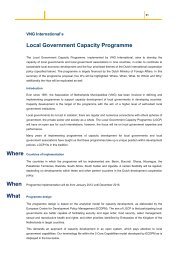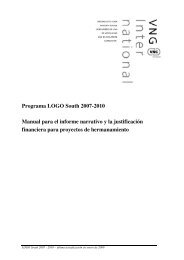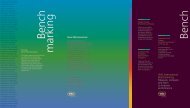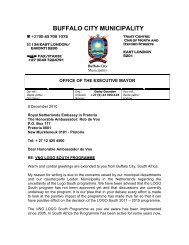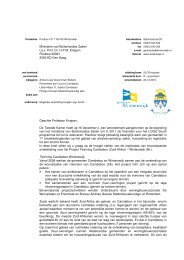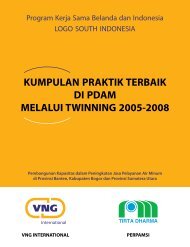Opmaak 1 - VNG International
Opmaak 1 - VNG International
Opmaak 1 - VNG International
You also want an ePaper? Increase the reach of your titles
YUMPU automatically turns print PDFs into web optimized ePapers that Google loves.
This is good, but does not mean automatically<br />
that the accountability mechanisms in Gedaref<br />
are working. The next subsection is about the<br />
mechanism or solutions in the World Bank<br />
model, but one thing specific to Gedaref needs<br />
to be mentioned here.<br />
Many service activities have been initiated and<br />
created and associated intermediary actors<br />
involved to solve particular problems in<br />
particular sectors. The result is the tangle of<br />
organizations and associations in which it is<br />
hard to assign outputs and roles precisely.<br />
Several contributions to accountability can be<br />
considered common efforts. This is a strength<br />
but the dependencies carry a risk too. If one<br />
intermediate actor does not function well,<br />
others may lack information and the voice of<br />
the poor may not reach the appropriate<br />
supplier. So far, there is no integrated plan for<br />
the coming years that rationalizes the<br />
structure, sets targets and allocates tasks.<br />
POSSIBLE SOLUTIONS<br />
But what if the programmes and intermediate<br />
actors in Gedaref are seen in the context of the<br />
three proposed solutions in the first part of this<br />
book? They are strengthening client power,<br />
increasing participation of the poor, and<br />
introducing user fees. In this subsection, these<br />
solutions are analyzed in the case of water,<br />
waste, health and education services in<br />
Gedaref. The way communication and<br />
feedback takes place is also taken into<br />
consideration.<br />
Client power<br />
A general observation in Gedaref is that the<br />
presence of so many intermediary<br />
organizations, public and private, allows<br />
citizens to compare the various services. This<br />
also makes local citizens aware of their rights.<br />
Allowing comparison and stimulating rightsbased<br />
consciousness are important steps<br />
towards client power.<br />
The Gedaref State Water Corporation supplies<br />
water to a large number of poor, either through<br />
pipes directly to the houses, or at water<br />
standpipes. At the same time the Gedaref State<br />
People’s Water Organization serves the poor in<br />
particular. The organization goes beyond the<br />
state in service delivery. It has become the<br />
support for local people as far as water supply<br />
is concerned. Although it does voice concerns,<br />
i.e. it is part of a feedback chain, it does not<br />
systematically perform as an interest group for<br />
beneficiaries. Neither do the fee collectors at<br />
the standpipes. So far there is no sign of any<br />
other attempts to set up an interest group.<br />
A different situation prevails in the waste<br />
sector. Through its Solid Waste Corporation<br />
the locality collects the waste and transports it<br />
to the landfill. The beneficiaries of the waste<br />
collectors are in a different position than of the<br />
water supply, as it is not a feasible option to cut<br />
off the service (health risks will arise if people<br />
leave waste in the streets again). At the same<br />
time there are several grass roots organizations<br />
that intervene between the beneficiaries and<br />
the government on the quality of the service.<br />
There are governmental ones, such as the waste<br />
health inspectors , as well as non-governmental<br />
ones, such as the home visitors. These home<br />
visitors, being intermediaries, can perform as a<br />
pressure group, though this has not yet become<br />
fully institutionalized.<br />
The emancipation of women is important in<br />
the framework of client power, as poor women<br />
are traditionally considered the ones who do<br />
not easily voice their concerns. It is obvious<br />
that women have become important players in<br />
the local community. The home visitors (who<br />
work in different intermediary institutions)<br />
stimulate poor women to be more selfconfident<br />
and to forcefully adapt their<br />
traditional modest role. Trained women are<br />
increasingly getting the feeling that they ‘own’<br />
the programmes. They are becoming proactive<br />
in solving problems and lobbying departments,<br />
instead of waiting for the government to act.<br />
Fifteen of the home visitors have a job at<br />
ministries and locality departments. This<br />
illustrates not only the web-like nature of<br />
service delivery, but also the access to the<br />
system that home visitors enjoy.<br />
42


